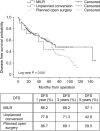Unplanned conversion during minimally invasive liver resection for hepatocellular carcinoma: risk factors and surgical outcomes
- PMID: 31909047
- PMCID: PMC6940425
- DOI: 10.4174/astr.2020.98.1.23
Unplanned conversion during minimally invasive liver resection for hepatocellular carcinoma: risk factors and surgical outcomes
Abstract
Purpose: Unplanned conversion is sometimes necessary during minimally invasive liver resection (MILR) of hepatocellular carcinoma (HCC). The aims of this study were to compare surgical outcomes of planned MILR and unplanned conversion and to investigate the risk factors after unplanned conversion.
Methods: We retrospectively analyzed 286 patients who underwent MILR with HCC from January 2006 to December 2017. All patients were divided into a MILR group and an unplanned conversion group. The clinicopathologic characteristics and outcomes were compared between the 2 groups. In addition, surgical outcomes in the conversion group were compared with the planned open surgery group (n = 505). Risk factors for unplanned conversion were analyzed.
Results: Of the 286 patients who underwent MILR, 18 patients (6.7%) had unplanned conversion during surgery. The unplanned conversion group showed statistically more blood loss, higher transfusion rate and postoperative complication rate, and longer hospital stay compared to the MILR group, whereas no such difference was observed in comparison with the planned open surgery group. There were no significant differences in overall and disease-free survival among 3 groups. The right-sided sectionectomy (right anterior and posterior sectionectomy), central bisectionectomy and tumor size were risk factors of unplanned conversion.
Conclusion: Unplanned conversion during MILR for HCC was associated with poor perioperative outcomes, but it did not affect long-term oncologic outcomes in our study. In addition, when planning right-sided sectionectomy or central bisectionectomy for a large tumor (more than 5 cm), we should recommend open surgery or MILR with an informed consent for unplanned open conversions.
Keywords: Hepatocelluar carcinoma; Minimally invasive liver resection; Open conversion.
Copyright © 2020, the Korean Surgical Society.
Conflict of interest statement
CONFLICTS OF INTEREST: No potential conflict of interest relevant to this article was reported.
Figures


References
-
- Han DH, Choi SH, Park EJ, Kang DR, Choi GH, Choi JS. Surgical outcomes after laparoscopic or robotic liver resection in hepatocellular carcinoma: a propensity-score matched analysis with conventional open liver resection. Int J Med Robot. 2016;12:735–742. - PubMed
-
- Stiles ZE, Glazer ES, Deneve JL, Shibata D, Behrman SW, Dickson PV. Long-term implication of unplanned conversion during laparoscopic liver resection for hepatocellular carcinoma. Ann Surg Oncol. 2019;26:282–289. - PubMed
-
- Andreou A, Struecker B, Raschzok N, Krenzien F, Haber P, Wabitsch S, et al. Minimal-invasive versus open hepatectomy for hepatocellular carcinoma: comparison of postoperative outcomes and long-term survivals using propensity score matching analysis. Surg Oncol. 2018;27:751–758. - PubMed
-
- Wakabayashi G, Cherqui D, Geller DA, Buell JF, Kaneko H, Han HS, et al. Recommendations for laparoscopic liver resection: a report from the second international consensus conference held in Morioka. Ann Surg. 2015;261:619–629. - PubMed
LinkOut - more resources
Full Text Sources

